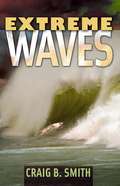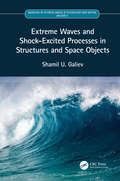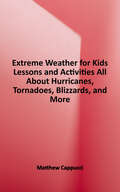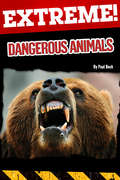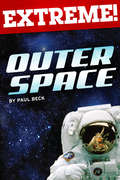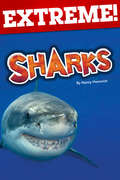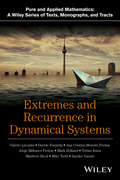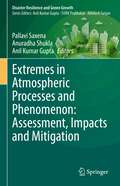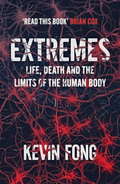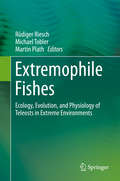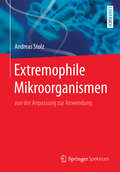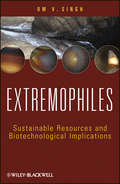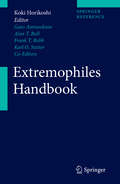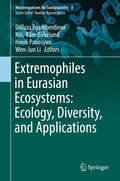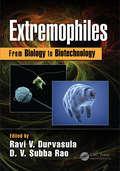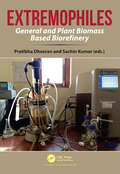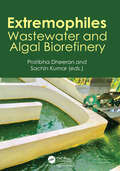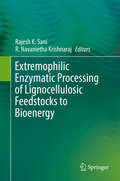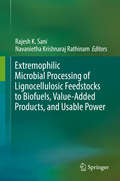- Table View
- List View
Extreme Waves
by Craig B. SmithWaves are hypnotic and beautiful. They can also be great fun. But Hurricanes Katrina and Rita taught us that they can be powerful and deadly while the 2004 tsunami proved that some waves are absolutely devastating. Science is the best tool for understanding and predicting the most extreme waves. Where do waves come from? Why are some big and some small? From winter to summer, the nature of the beach changes, sculpted by the tireless energy of waves. Most waves are simply rhythmic expressions of Earth's movement through space and the changes they bring to our shorelines are gradual. But given the right weather conditions and combination of natural forces, waves can wreak havoc. These are extreme waves, waves that can stretch 100-feet high--posing an imminent threat to large sea vessels and coastal structures. There are even waves that have stripped trees from mountains as they surged to an estimated 1,700 feet high. But even smaller waves are dangerous to ships and coastlines. Indeed, the lessons of the 2004 Bay of Bengal tsunami and the damage wrought by recent tidal surges in New Orleans underscore the need for better tracking and prediction of extreme waves. Extreme Waves is a fascinating history of waves. Covering both the headline stories as well as incidents that are less well-known but equally startling Craig Smith, author and amateur sailor, will have you riveted from the first chapter to the last.
Extreme Waves and Shock-Excited Processes in Structures and Space Objects: Volume II (Modeling of Extreme Waves in Technology and Nature)
by Shamil U. GalievThe theory of waves is generalized on cases when waves change medium in which they appear and propagate. A reaction of structural elements and space objects to the dynamic actions of the different nature, durations, and intensities is studied. It considers the effects of transitions in the state and phase equations of media on the formation and propagation of extreme waves as a result of power, thermal, or laser pulsed action. The influence of cavitation and cool boiling of liquids, geometric and physical nonlinearity of walls on containers’ strength, and the formation of extreme waves is studied. The theory can be also used to optimize impulse technology, in particular, in the optimization of explosive processing of sheet metal by explosion in a liquid. This book was written for researchers and engineers, as well as graduate students in the fields of thermal fluids, aerospace, nuclear engineering, and nonlinear waves.
Extreme Weather for Kids: Lessons and Activities All About Hurricanes, Tornadoes, Blizzards, and More!
by Matthew CappucciExtreme Weather for Kids is a whirlwind ride through the wild world of weather, written in accessible language and complemented by vivid descriptions and imagery. Designed to harness children’s natural curiosity, this action-packed introduction to meteorology incorporates first-hand accounts from inside Mother Nature’s most dramatic moments. For each phenomenon introduced, explanatory text, informative illustrations, sidebars, and asides allow readers to explore at their own pace. Along with storm-chasing reports and photos from in the field, each chapter includes a step-by-step hands-on activity for engaging with the science. What is the polar vortex? And why does a disrupted “polar vortex” lead to extreme cold air outbreaks across Europe, Asia, and North America? Among the many “in case you were wondering” questions addressed: - How strong can a hurricane get? - What’s the biggest tornado to have ever happened? - How large can hail get? - Is “thunders now” real? How does it form? - How thick is lightning? And how powerful is it? - Where can I find “fossilized lightning?” - Can it snow in the desert? - What are “solar storms?” - What makes the northern (and southern) lights? Weather is one of the most accessible sciences there is. Everyone experiences it in some way or another, and learning the basics behind it naturally sparks interest in other sciences. That’s why Extreme Weather for Kids also teaches the basic principles of scientific observation while placing a key emphasis on safety. Extreme Weather for Kids is sure to awaken the joy of learning rain or shine.
Extreme physics
by Jeff Colvin Jon LarsenMost matter in the Universe, from the deep interior of planets to the core of stars, is at high temperature or high pressure compared to the matter of our ordinary experience. This book offers a comprehensive introduction to the basic physical theory on matter at such extreme conditions and the mathematical modeling techniques involved in numerical simulations of its properties and behavior. Focusing on computational modeling, the book discusses topics such as the basic properties of dense plasmas; ionization physics; the physical mechanisms by which laser light is absorbed in matter; radiation transport in matter; the basics of hydrodynamics and shock-wave formation and propagation; and numerical simulation of radiation-hydrodynamics phenomenology. End-of-chapter exercises allow the reader to test their understanding of the material and introduce additional physics, making this an invaluable resource for researchers and graduate students in this broad and interdisciplinary area of physics.
Extreme: Dangerous Animals
by Paul BeckWarning: Extreme danger! They stalk, sting, pounce, and chomp. They're the deadliest creatures on earth, and now you can see why as you explore them all through incredible action photos. Extreme: Dangerous Animals brings you face-to-face with tigers, wolves, great whites, and cobras--and a few animals you might not expect!
Extreme: Outer Space
by Paul BeckExplore outer space from our solar system to the edges to the universe! Extreme: Outer Space pairs the most bizarre and mind-blowing facts about our planets with breathtaking images!
Extreme: Sharks
by Nancy HonovichGo face-to-face with the world's most awesome predators! Extreme: Sharks is packed with incredible photos of the most fascinating creatures in the sea!
Extremes (Darwin College Lectures #31)
by Duncan Needham Julius WeitzdörferHumanity is confronted by and attracted to extremes. Extreme events shape our thinking, feeling, and actions; they echo in our politics, media, literature, and science. We often associate extremes with crises, disasters, and risks to be averted, yet extremes also have the potential to lead us towards new horizons. Featuring essays by leading intellectuals and public figures arising from the 2017 Darwin College Lectures, this volume explores 'extreme' events, from the election of President Trump, the rise of populism, and the Brexit referendum, to the 2008 financial crisis, the Syrian war, and climate change. It also celebrates 'extreme' achievements in the realms of health, exploration, and scientific discovery. A fascinating, engaging, and timely collection of essays by renowned scholars, journalists, and intellectuals, this volume challenges our understanding of what is normal and what is truly extreme, and sheds light on some of the issues facing humanity in the twenty-first century.
Extremes and Recurrence in Dynamical Systems
by Valerio Lucarini Ana De Freitas Jorge De Freitas Davide Faranda Mark Holland Matthew Nicol Mike Todd Sandro Vaienti Jeroen WoutersPresents recent advances on the theory of extreme values that result from investigations of dynamical systems applications Written by a team of international experts, Extremes and Recurrence in Dynamical Systems presents a unique point of view on the mathematical theory of extremes and how it relates to applications in the natural and social sciences. Featuring an interdisciplinary approach to new concepts in pure and applied mathematical research, the book skillfully combines the areas of statistical mechanics, probability theory, measure theory, dynamical systems, statistical inference, geophysics, and software application. Emphasizing statistical mechanics, the book introduces robust theoretical embedding for the application of extreme value theory and modeling through dynamical systems. Extremes and Recurrence in Dynamical Systems also features: A careful examination of how a dynamical system can be taken as a generator of stochastic processes Discussions on the applications of statistical inference in the theoretical and heuristic use of extremes Several examples of analysis of extremes in a physical and geophysical context A final summary of the main results presented with a discussion of forthcoming research guidelines An appendix with software Matlab® and Octave programming language to help readers to develop further understanding of the presented concepts Extremes and Recurrence in Dynamical Systems is ideal for academics and practitioners in pure and applied mathematics, probability theory, statistics, chaos, theoretical and applied dynamical systems, statistical mechanics, geophysical fluid dynamics, geosciences and complexity science.
Extremes in Atmospheric Processes and Phenomenon: Assessment, Impacts and Mitigation (Disaster Resilience and Green Growth)
by Anil Kumar Gupta Pallavi Saxena Anuradha ShuklaThis edited book first gives an overview of issues in the studies of atmospheric sciences and then elaborates on extreme events in air pollution, their assessment, impacts, and mitigation strategies. It covers general overview of factors governing in atmosphere that lead to air pollution, description about recent and hazardous air pollution episodes, emergencies and extremes in atmospheric sciences, impact studies on living organisms and atmosphere related to emergencies and possible remedies/mitigation strategies which may also include green growth strategies for management. Increase in anthropogenic activities from different sources results in very high concentrations of air pollutants in the atmospheres and they lead to cause disturbance in seasonal cycles and atmospheric phenomena, ecological imbalance and change in the quality of air. These impacts are the major cause of short-term or long-term effects on living and non-living systems. In the recent years, several instances of extremes atmosphere and air pollution related emergencies causing accidental episodes, fog, smog, health related, heat and cold wave etc. are experienced. This book brings the attention on such issues in atmospheric sciences and discuss the disaster preparedness and management plus emergencies. This book is valuable reading material for students in Environmental Science, Biological Science, Medical Science, Policy Planning, Disaster Management and Agriculture. It’s useful for environmental consultants, researchers and other professionals involved in air quality, plant, humans and disasters related research.
Extremes: Life, Death and the Limits of the Human Body
by Kevin FongIn anaesthetist Dr Kevin Fong's television programmes he has often demonstrated the impact of extremes on the human body by using his own body as a 'guinea pig'. So Dr Fong is well placed to share his experience of the sheer audacity of medical practice at extreme physiological limits, where human life is balanced on a knife edge. Through gripping accounts of extraordinary events and pioneering medicine, Dr Fong explores how our body responds when tested by the extremes of heat and cold, vacuum and altitude, age and disease. He shows how science, technology and medicine have taken what was once lethal in the world and made it survivable. This is not only a book about medicine, but also about exploration in its broadest sense - and about how, by probing the very limits of our biology, we may ultimately return with a better appreciation of how our bodies work, of what life is, and what it means to be human.
Extremist Propaganda in Social Media: A Threat to Homeland Security
by Michael ErbschloeExtremist Propaganda in Social Media: A Threat to Homeland Security presents both an analysis of the impact of propaganda in social media and the rise of extremism in mass society from technological and social perspectives. The book identifies the current phenomenon, what shall be dubbed for purposes of this book "Blisstopian Societies"—characterized in the abiding "ignorance is bliss" principle—whereby a population is complacent and has unquestioning acceptance of a social doctrine without challenge and introspection. In these subcultures, the malleable population self-select social media content, "news," and propaganda delivery mechanisms. By doing so, they expose themselves only to content that motivates, reinforces, and contributes to their isolation, alienation, and self-regulation of the social groups and individuals. In doing this, objective news is dismissed, fake—or news otherwise intended to misinform—reinforces their stereotyped beliefs about society and the world around them. This phenomenon is, unfortunately, not "fake news," but a real threat to which counterterror, intelligence, Homeland Security, law enforcement, the military, and global organizations must be hyper-vigilant of, now and into the foreseeable future. Chapters cite numerous examples from the 2016 political election, the Russia investigation into the Trump Campaign, ISIS, domestic US terrorists, among many other examples of extremist and radicalizing rhetoric. The book illustrates throughout that this contrived and manufactured bliss has fueled the rise and perpetuation of hate crimes, radicalism, and violence in such groups as ISIS, Boko Haram, Neo-Nazis, white separatists, and white supremacists in the United States—in addition to perpetuating ethnic cleansing actions around the world. This dynamic has led to increased political polarization in the United States and abroad, while furthering an unwillingness and inability to both compromise or see others’ perspectives—further fomenting insular populations increasing willing to harm others and do violence. Extremist Propaganda in Social Media relates current Blisstopian practices to real-world hate speech and violence, connecting how such information is consumed by groups and translated into violent action. The book is an invaluable resources for those professionals that require an awareness of social media radicalization including: social media strategists, law enforcement, Homeland Security professionals, military planners and operatives—anyone tasked with countering combat such violent factions and fringes in conflict situations.
Extremophile Fishes
by Rüdiger Riesch Michael Tobler Martin PlathThis book summarizes the key adaptations enabling extremophile fishes to survive under harsh environmental conditions. It reviews the most recent research on acidic, Antarctic, cave, desert, hypersaline, hypoxic, temporary, and fast-flowing habitats, as well as naturally and anthropogenically toxic waters, while pointing out generalities that are evident across different study systems. Knowledge of the different adaptations that allow fish to cope with stressful environmental conditions furthers our understanding of basic physiological, ecological, and evolutionary principles. In several cases, evidence is provided for how the adaptation to extreme environments promotes the emergence of new species. Furthermore, a link is made to conservation biology, and how human activities have exacerbated existing extreme environments and created new ones. The book concludes with a discussion of major open questions in our understanding of the ecology and evolution of life in extreme environments.
Extremophile Mikroorganismen: Von Der Anpassung Zur Anwendung
by Andreas StolzDieses Buch gibt einen aktuellen Überblick über die Lebensräume und Lebensweisen extremophiler Mikroorganismen. In neun kompakten Kapiteln beleuchtet der Autor die Anpassungsfähigkeit extremophiler Mikroorganismen. Pro Kapitel wird wird ein extremer Lebensraum und seine Bewohner beschrieben und spannende Fragen beantwortet wie: Welche Typen lebensfeindlicher Gebiete auf der Erde können besiedelt werden? Welche Arten von Organismen sind hierzu befähigt? Welche Anpassungen haben sich entwickelt, damit diese Organismen in Umgebungen überleben können, die als lebensfeindlich gelten? Welche Hinweise gibt es zur Entstehung und Entwicklung der ersten Lebensformen in extremen Habitaten und kann man die Erkenntnisse über irdische Extremophile zur Abschätzung der Wahrscheinlichkeit außerirdischen Lebens nutzen? Dem Leser wird so ein Einstieg in dieses moderne Gebiet der Biologie ermöglicht. Der Autor zeigt in verschiedenen Beispielen unterschiedlichste Anwendungsmöglichkeiten extremophiler Organismen in der Biotechnologie auf. Hierbei reicht das Spektrum vom Einsatz der DNA-Polymerasen aus (hyper-)thermophilen Mikroorganismen für die Polymerase-Kettenreaktion, eine der wichtigsten Techniken der Biotechnologie, bis zum Einsatz acidophiler Mikroorganismen zur Gewinnung von Kupfer und Gold. Für Studierende und Wissenschaftler, die sich für die Vielfalt und Anpassungsfähigkeit von Mikroorganismen und deren Potenzial für die Biotechnologie und Industrie interessieren, ist dieses einführende Lehrbuch eine Bereicherung.
Extremophiles
by Om V. SinghExplores the utility and potential of extremophiles in sustainability and biotechnologyMany extremophilic bio-products are already used as life-saving drugs. Until recently, however, the difficulty of working with these microbes has discouraged efforts to develop extremophilic microbes as potential drug reservoirs of the future. Recent technological advances have opened the door to exploring these organisms anew as sources of products that might prove useful in clinical and environmental biotechnology and drug development.Extremophiles features outstanding articles by expert scientists who shed light on broad-ranging areas of progress in the development of smart therapeutics for multiple disease types and products for industrial use. It bridges technological gaps, focusing on critical aspects of extremolytes and the mechanisms regulating their biosynthesis that are relevant to human health and bioenergy, including value-added products of commercial significance as well as other potentially viable products.This groundbreaking guide:Introduces the variety of extremophiles and their extremolytes including extremozymesProvides an overview of the methodologies used to acquire extremophilesReviews the literature on the diversity of extremophilesOffers tools and criteria for data interpretation of various extremolytes/extremozymesDiscusses experimental design problems associated with extremophiles and their therapeutic implicationsExplores the challenges and possibilities of developing extremolytes for commercial purposesExplains the FDA's regulations on certain microbial bio-products that will be of interest to potential industrialistsExtremophiles is an immensely useful resource for graduate students and researchers in biotechnology, clinical biotechnology, microbiology, and applied microbiology.
Extremophiles Handbook
by Garabed Antranikian Koki Horikoshi Alan T. Bull Frank T. Robb Karl O. StetterThe Extremophiles Handbook brings together the rapidly growing and often scattered information on microbial life in the whole range of extreme environments. This book will be a useful reference for finding clues to the origin of life and for exploring the biotechnology potential of these fascinating organisms.
Extremophiles for Sustainable Agriculture and Soil Health Improvement
by Sajad Majeed Zargar Abhishek Chauhan Anuj Ranjan Vishnu D. Rajput Tatiana Minkina Evgeniya Valer’evna PrazdnovaThis volume presents recent biotechnological advances in the application of extremophiles in sustainable agricultural production, plant health and soil remediation. It highlights the physiology and biochemistry of extremophiles to ensure their survival and adaptation under stressful agricultural conditions, as well as their ecological diversity and taxonomical attributes that allow them to be useful in improving abiotic and biotic tolerance among crops. The chapters cover genomic, metagenomic and metabolomic approaches for improving crop production, biocontrol, nutrient solubilization and soil health to ensure food and nutrition security in a sustainable manner in difficult growing environments. The book will be useful for students and researchers studying soil and plant management, sustainable agriculture, microbiology and biochemistry.
Extremophiles in Eurasian Ecosystems: Ecology, Diversity, and Applications (Microorganisms for Sustainability #8)
by Dilfuza Egamberdieva Nils-Kåre Birkeland Hovik Panosyan Wen-Jun LiThis book explores various aspects of thermophilic and halophilic microbes from Eurasian ecosystems, which have proved to offer a unique reservoir of genetic diversity and biological source of extremophiles. It also covers the biotechnological uses of extremophiles, and their potential use in agricultural and industrial applications. The topics addressed include but are not limited to: diversity and microbial ecology, microbe-environment interactions, adaptation and evolution, element cycling and biotechnological applications of thermophiles and halophiles in Eurasian ecosystems. In order to review the progress made in biology and biotechnological applications of thermophiles and halophiles, the book combines review papers and results of original research from various specialists and authorities in the field. It includes several chapters describing the microbial diversity and ecology of geothermal springs distributed among the territory of various Eurasian countries, such as Armenia, Bulgaria, China, Georgia, India, Italy, Pakistan and Turkey. A dedicated chapter discusses selected aspects of thermophilic chemolithotrophic bacteria isolated from mining sites (sulfide ores); detailed descriptions of various thermophile microbes isolated from high-temperature environments and their biotechnological potential are also provided. Subsequent chapters describe the diversity and ecology of halophilic microbes harbored in saline and hypersaline lakes in Iran, Turkey and China; soil and plant microbiomes in saline arid lands of Uzbekistan; microbial diversity in Asian deserts; and the potential applications of thermophilic and halophilic microbes as exopolysaccharide (EPS) producers, focusing on the chemistry and applications of the EPS they produce. We hope that this book will prove valuable as an up-to-date overview of the current state of research on Eurasian extremophiles in general and thermophiles and halophiles in particular. Many questions remain unanswered, and we hope that it will stimulate further studies in this intriguing and promising field.
Extremophiles: From Biology to Biotechnology
by Ravi V. Durvasula D. V. Subba RaoHighly recommended by CHOICE, Oct 2018 Key features: Couples studies of marine extremophile biology/genomics and extremophile culture for biotechnological applications with the latest advances in bio-prospecting and bio-product development Includes practical experiments that a laboratory can use to replicate extreme habitats for research purposes Presents latest advances in extremophile genomics to give the reader a better understanding of the regulatory mechanisms of extremophiles Offers insights into the production of commercially important extremozymes, carotenoids, bioactive compounds and secondary metabolites of medicinal value Extremophiles are nature’s ultimate survivors, thriving in environments ranging from the frozen Antarctic to abyssal hot hydrothermal vents. Their lifeforms span bacteria to fishes, and are categorized as halophiles from hypersaline environments, acidophiles from acidic waters, psychrophiles from cold habitats, and thermophiles from warm waters. Extremophiles: From Biology to Biotechnology comprehensively covers the basic biology, physiology, habitats, secondary metabolites for bioprospecting, and biotechnology of these extreme survivors. The chapters focus on the novel genetic and biochemical traits that lend these organisms to biotechnological applications. This unique guide serves as a resource for biotechnologists who wish to explore extremophiles for their commercial potential, as well as a valuable reference for teaching undergraduate, graduate and postgraduate students.
Extremophiles: General and Plant Biomass Based Biorefinery
by Pratibha DheeranThis book, Extremophiles: General and Plant Biomass Based Biorefinery, explores the potential of extremophiles in industries and biomass based biorefinery. The book sheds light on diversity and various applications of thermophiles, psychrophiles, halophiles, alkaliphiles and acidophiles for the production of value-added products including biofuels, extremozymes, etc. The chapters comprehensively emphasize the utility of extremophiles in sustainable biorefinery bioprocesses. This book is an integrated source of literature for scientists, engineers, academicians, and students working in the area of extremophiles, microbial technology and biorefinery.
Extremophiles: Wastewater and Algal Biorefinery
by Sachin Kumar Pratibha DheeranThis book ‘Extremophiles: Wastewater and Algal Biorefinery’ explores the potential of extremophiles/extremotolerant organisms in wastewater treatment, biorefining of algal biomass and in the treatment of industrial waste effluent. The book provides a holistic overview about the current status of extremophiles in waste water treatment and various industrial processes. The chapters comprehensively cover the scientific and research findings on various industrial applications of extremophiles such as biofuels, extremozymes, electricity generation, biofilms, microbial corrosion and waste water treatment etc. This book is an integrated source of literature for the scientists, engineers, academicians, and students working in the area of extremophiles, microbial technology and biorefinery.
Extremophilic Cyanobacteria For Novel Drug Development
by Sikha Mandal Jnanendra RathThis volume presents recent developments in the novel drug development and potential of extremophilic cyanobacteria. It discusses how these tiny organism originated, produce oxygen that leads to evolution of life on the earth, how their survival strategies in extreme climatic conditions lead to diverse metabolic pathways, and the opportunity to use them to develop novel drugs. The book is comprised of five chapters, starting with the origin of cyanobacteria, their survival strategies under extreme conditions, and their capabilities to change metabolic activities. The second chapter explores the different metabolic pathways found in cyanobacteria and examines advances in this field and recent techniques like MALDI-TOF imaging and metagenomics tools as well as in silico techniques for rapid screening of secondary metabolites. Further chapters cover the glycomics of cyanobacteria, anticancer drug development, and some issues and challenges of using cyanobacteria to develop drugs. Extremophilic Cyanobacteria For Novel Drug Development provides insight into future perspectives in drug development and is a key resource for students, researchers and professionals in pharmacy, medicinal chemistry, pharmacognosy biotechnology, biology, and academics.
Extremophilic Enzymatic Processing of Lignocellulosic Feedstocks to Bioenergy
by Rajesh K. Sani R. Navanietha KrishnarajThis book introduces fundamentals of enzymatic processes, various renewable energy resources and their pretreatment processes. It presents in-depth review of extremophilic enzymes (e. g. , Cellulases, Xylanases, Lytic Polysaccharide Monooxygenases, Amylases, Ligninases, Pectinases, Esterases, and Chitinases) which can be used in several biotechnological processes. In addition, the authors present expert knowledge on how to engineer enzymes for enhanced conversion of lignocellulosic feedstocks to biofuels. Extremozymes play important roles in many kinds of bioprocessing e. g. , in conversion of non-food biomass into usable power. Existing enzymatic technologies, including hydrolysis of lignocellulose into sugars, have several limitations such as they have very slow enzymatic hydrolysis rates, yields low products, requires high dosages of enzymes, and are sensitive to microbial contamination problems. These limitations could be overcome using extremophilic enzymes.
Extremophilic Fungi: Ecology, Physiology and Applications
by Sanjay SahayThis contributory volume is a comprehensive account of recent research on extremophilic fungi. It brings to the readers, latest information on all categories of extremophilic fungi, their isolation, culture, and potential applications. The book aims at providing the audience in-depth and updated theoretical concepts, also application on the field. It will serve as a supplementary reading material in addition to basic mycology textbooks. The book fills the gap in literature and will be useful to the postgraduate students and researchers in the field of mycology, agriculture, biotechnology and Microbiology.
Extremophilic Microbial Processing of Lignocellulosic Feedstocks to Biofuels, Value-Added Products, and Usable Power
by Rajesh K. Sani Navanietha Krishnaraj RathinamThis book presents a review and in-depth analyses of improved biotechnological processes emphasizing critical aspects and challenges of lignocellulosic biomass conversion into biofuels and value-added products especially using extremophiles and recombinant microorganisms. The book specifically comprises extremophilic production of liquid and gaseous biofuels (bioethanol, biobutanol, biodiesel, biohydrogen, and biogas) as well as value added products (e.g. single cell protein, hydrocarbons, lipids, exopolysaccharides, and polyhydroxyalkanoates). The book also provides the knowledge on how to develop safe, more efficient, sustainable, and economical integrated processes for enhanced conversion of lignocellulosic feedstocks to liquid and gaseous biofuels. Finally the book describes how to perform the techno-economical and life-cycle assessments of new integrated processes involving extremophiles. These modeling exercises are critical in addressing any deficiencies associated with the demonstration of an integrated biofuels and value-added products production process at pilot scale as well as demonstration on the commercialization scale.
